Bedlam; nut house; funny farm; cuckoo's nest; mad house; loony bin. These are all names given to those strange and mysterious places more correctly known as psychiatric hospitals. While the stigma surrounding mental ill-health is being chipped away at - albeit rather slowly - it seems that these hospitals remain an alien and frightening concept in the public's mind, masking their uncertainties behind flippant names and bizarre myths. In my local area, for example, there used to be a peculiar rumour that if you checked someone into the psychiatric hospital (as if it was some sort of hotel!) you earned yourself a toaster in return!!
If you asked a random assortment of people to describe their mental image of a psych ward, chances are they would speak to you of straight-jackets and padded rooms; of volatile chaos and people being injected against their will; of "sections" and of nurses keeping "safe" behind glass screens. It's not that they're deliberately telling a horror story, it's just that they genuinely don't know any different. It's this outdated 'One Flew Over the Cuckoo's Nest' style picture that helps perpetuate stigma and fear, both among the general public and those who might actually benefit from using the service, making admission a daunting and terrifying prospect.
But the thing is - as someone who's been an inpatient in a number of psychiatric wards and hospitals now- these images are, these days, very far from the truth. In fact, what is actually most shocking about these places is just how mundane it all is!
Some time ago now, during one of those admissions, I used Snapchat to document a day in the life of a psychiatric inpatient, trying to give a little insight into what it's really like on a hospital ward. I thought that today - being an inpatient again on what is World Mental Health Day - I would share an extended version of that effort.
Prepare to roll your eyes at my silly Snapchat pictures and perhaps be surprised by how ordinary everything is..
A day in the life of an inpatient on an adult acute psychiatric ward:
7am: I'm usually still asleep at this time, but today I'm not and so the day begins to the sound of the nursing day shift arriving and meeting with the night staff for handover, where they're updated on what's unfolded throughout the evening and how each patient is getting on.
7:45am: Morning Medication. I'm roused by the sound of staff calling us (some more gently than others) to come and queue at the clinical room for our morning dose of pills, creams, medicines or inhalers. The majority of patients receive meds at this time and so the temptation to hide under the covers until the queue dies down is strong!
8am: Breakfast. I'm not having any today - I'm pretty terrible at doing breakfast - but there's usually a choice of porridge, toast or four cereals for patients to help themselves to, along with milk, fruit juice and tea. I grab a cup of tea, claiming a mug as mine for the rest of the day!
I take a shower, utilising the ward's endless supply of towels and my own toiletries, once the tea is done.
9am: It's Monday so the housekeeper arrives in our dorm - which I share with 5 other ladies - ready to strip our beds and make everything nice and tidy at the start of this new week.
9:30am: I hear the doctors - junior doctors, consultant psychiatrists, medical students and the ward's speciality doctor - beginning to arrive. Patients are usually treated by one particular medical team, each with its own consultant and junior doctor. This ward has four of these teams, so there is understandably lots of coming and going throughout the day.
9:30am-11am: Monday is usually review day and the multidisciplinary team meeting for my team, but my doctors are on holiday this week so no one needs to see me today. Normally I'd see a doctor to discuss how I'm getting on, to look at any changes to medication, to establish my level of risk/safety and ability to spend time off the ward, and to think about plans for the week ahead and what support can be put in place in the community.
Instead, I spend my morning reading a book in the lounge for a little while, then play around on my laptop, which I keep in my bed-space.
Some mornings we have the option of participating in more organised activities - joining the weekly walking group or art session off the ward, or spending time with the activity coordinator when he comes to visit.
11:30am: My CPN (community psychiatric nurse) pops in to catch-up. Patients will have an array of different professionals involved in their wider care plan - social workers, support workers, occupational therapists, physiotherapists, advocacy workers, and so on - who might come to visit, plan or do some work with them for a period throughout the day.
12pm: Lunch is served in the dining room: soup, followed by a choice of three hot main courses, or a salad or sandwich. I am something of a dietary nightmare, but they seem, at last, to be trying their best to cater for me. Mealtimes are "protected" so visitors are not allowed and doctors/other professionals, likewise, shouldn't disturb us during this time.We generally eat together at the table, for a bit of normality, though it's okay to eat in your bed-space if you find this difficult.
I always used to eat in my room (if I ate at all), but these days I try to suss out the atmosphere and decide whether or not to stay. It can sometimes be a bit loud and overwhelming, or there's a feeling that something is about to kick off, but the majority of the time it's okay. I like chatting with the other patients and hearing about their ordinary lives. A woman tells me, today, about a trial she's participating in for a piece of mental health research.
1pm: Afternoon medication. I see a handful of people gathering outside the clinical room for afternoon meds, but I don't take any at this time so carry on to my bed-space.
12:30-4:30pm: This time is much like the period in the morning, where things may or may not be happening. Sometimes a doctor's review; sometimes a professional popping in; sometimes a coordinated activity to do. You might have a friendly visitor or two - they're welcome all day, besides mealtimes - or perhaps you'll get an escorted walk to the hospital shop, or some time out alone, depending on your status (based on risk assessment) on the board.
Today I spend my afternoon writing on the blog and making regular cups of tea in the patients' kitchenette, which is stocked with tea, coffee, sugar and (hopefully) milk. It's a nice day so I debate sitting outside in the garden for a while, but I'm not good at dealing with lots of people - which there are out there - and so I don't. I bump into my social worker in the corridor, who comments that I'm looking well, and I briefly catch a word with a nurse, but I don't talk long as they are, as always, short staffed.
4:30pm: I head out to meet a friend. In the previous weeks I've worked my way up from only being allowed off the ward with an escort, to being allowed out for 30 minutes alone, then 2 hours on my own, to the point now, where I'm allowed out unescorted for an unspecified period of time, as long as they know roughly where I am and when I'll be back. I have my mobile on me at all times so they can call if, for any reason, they're concerned.
5pm: I'm not there, but dinner will be served in the dining room at this time: a choice of three hot main meals, or a cold salad or sandwich, followed by a choice of hot or cold dessert.
6pm: Evening medication will be dished out to those who need it.
6-9:30pm: Most staff, besides the nursing team, have clocked off around 5pm so this is completely unstructured time. Lots of patients have visitors in the evening, while some will go out for a little while and others will stick to the ward, watching television in the lounge, resting in their bed space, using the smoking areas or the kitchenette. The remote control can be a much coveted prize in the living room!
7pm: The evening nursing staff will be arriving and, like the morning, receiving a handover of all that's transpired concerning patients during the day.
8pm: Tea and toast! One of the healthcare assistants will dish up a mountain of toast and a huge pot of tea for patients to help themselves to.
8:30pm: I get back from time out with my friend. I've had a nice time in her company, but I'm exhausted now. Being out in the "real world" can be daunting and it's hard work to put on a brave face and appear functioning when your "wounds" have, in the hospital, felt so raw and exposed. I try to catch a member of staff to chat things over with.
9:30pm: Night-time medication. We're rounded up for our final dose of the day. Most people will take something at this time - even if just to help them sleep - and so the queue outside the clinical room can be long. I'm lazy, so I wait in my room until they're almost at the end.
10pm: Time for bed. I change into my pyjamas and pull the curtains all the way round my bed.
Sometimes the nights in here can be loud - people having nightmares, or waking distressed and confused, or getting annoyed that they can't make themselves a cup of tea at 3am - but, at the end of the day, we're all just trying our best to deal with the battles in our own heads. Other nights, the only disruptions are the nursing staff doing their hourly checks (which they do all day and night), discreetly shining a little torch into your bed space.
I'm lucky in that I will mostly sleep the whole night through once I've had my meds and will be oblivious to everything until the next day dawns and we start again at 7am!
----
See, not so strange or scary, right? And not a padded room or straight-jacket in sight! I'm not going to pretend that it's a great place to be (no one would choose to have the restrictions on their freedom that it brings, for example); nor can I deny that occasionally - with people struggling with difficult feelings, or not under full control of their actions - things do kick off. But these instances are few and far between and are well-managed by a staff team who have their responses down to a fine art and whose primary concern is to keep their patients safe. For the most part, things are pretty peaceful and we all muddle along in a way that isn't odd or alien, but actually surprisingly ordinary.
There's a long way to go in breaking down the walls of stigma that surround both psychiatric hospitals and mental ill-health, but I hope that, by continuing to dispel the myths and speak out, the bricks of those walls will come gently crumbling down.
For more on mental health this World Mental Health Day, check out the Mental Health Foundation, Heads Together, the Scottish Association for Mental Health, or Mind.
xo

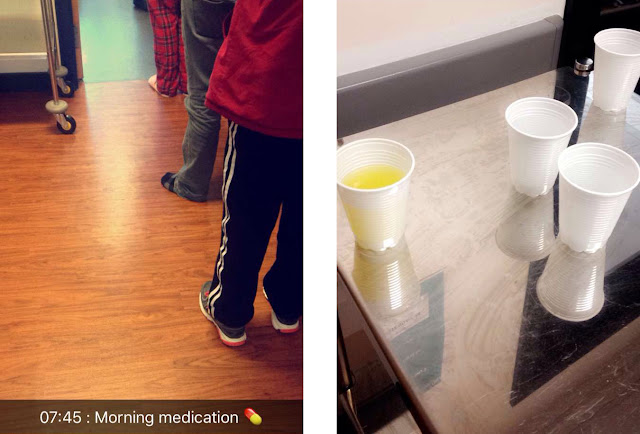


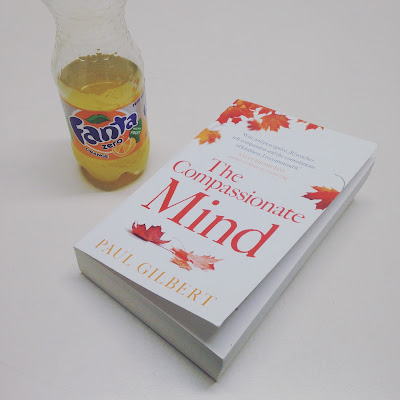



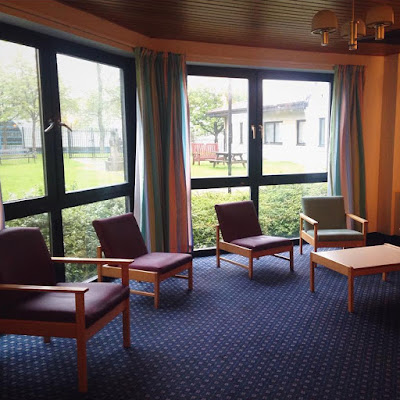

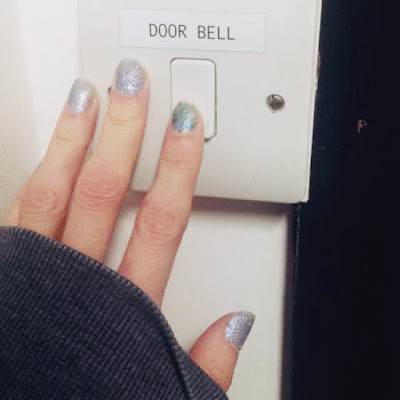


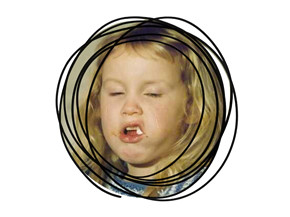






2 Comments
Thanks for sharing a day in the life, hopefully it makes more people aware how hospitals really are and what its like as an inpatient. Its not as its portrayed in films and tv that's for sure and seems just like any other hospital ward.
ReplyDeleteThanks for that post, Laura. Today I have the chance to catch up on blog reading for the first time in quite a while - I'm sorry to read that you're in hospital, but I know that psychiatric hospitals are calm and compassionate places. As you say, when people need that level of care, that is the right place to be. I have a friend who spends months in the hospital every year having her medications adjusted. She is then able to rejoin the world, often after a period of gradual adjustment, and when she is better, she is such an amazing force for good. So I am very grateful for psychiatric hospitals. Sending you love and good wishes. X
ReplyDelete